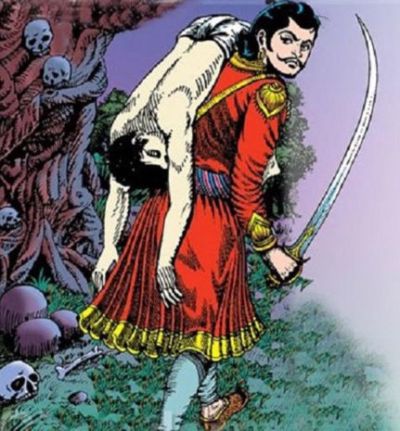Read the previous part here…
Now I have a question for you. Which of the two – Caṇḍasiṃha or Sattvaśīla, was braver? Who showed the most courage by plunging into the ocean? Tell me, o wise king. Remember, if you know the answer, and don’t tell me the truth, your head will burst into a hundred pieces!

एतयोः सत्त्वशीलो ऽत्र स मे सत्त्वाधिको मतः ।
स ह्य् अविज्ञाततत्त्वार्थो निरास्थः पतितो ऽम्बुधौ ॥ १२,१४.११२ ॥
राजा तु तत्त्वं विज्ञाय विवेशाम्भोधिम् आस्थया ।
दैत्यकन्यां च नावञ्छद् असाध्या स्पृहयेति सः ॥ १२,१४.११३ ॥
इति तस्याकर्ण्य वचो निरस्तमौनस्य भूपतेः स्कन्धात् ।
स जगाम पूर्ववत् तं वेतालः शिंशपातरुं स्वपदम् ॥ १२,१४.११४ ॥
राजापि तथैव स तं पुनर् अप्य् आनेतुम् अनुजगाम जवात् ।
प्रारब्धे ह्य् असमाप्ते कार्ये शिथिलीभवन्ति किं सुधियः ॥ १२,१४.११५ ॥
King Vikram replied…
“I consider Sattvaśīla to be the braver of the two men. He plunged into the sea without knowing anything about where the flagstaff would lead, or what would happen to him. The king on the other hand, already had information about what had happened the first time, and also had something to look forward to. Sattvaśīla, on the other hand, was brave enough to venture into unchartered territory.”
As the king uttered these words, the Vetāla flew off his shoulder, laughing. And King Vikram once more started to walk towards the banyan tree, determined to fetch him.
अष्टमो वतेालः
The Eighth Story
The story of the three sensitive Brahmins
गत्वा तां शिंशपां भूयो वेतालं प्राप्य भूमिपः ।
तं त्रिविक्रमसेनो ऽत्र स्कन्धे कृत्वोच्चचाल सः ॥ १२,१५.१ ॥
प्रयान्तं स पुनस् तं च वेतालः स्कन्धतो ऽब्रवीत् ।
श्रमविस्मृतये राजन् मत्तः प्रश्नम् इमं शृणु ॥ १२,१५.२ ॥
King Vikram went back to the banyan tree and found the Vetāla there. He brought down the corpse and threw it across his shoulders, and started to walk back once again.
The Vetāla said “O king, listen to me. You must be tired. Let me tell you a story to ease your fatigue.”
अङ्गदेशे ऽग्रहारो ऽस्ति महान् वृक्षघटाभिधः ।
विष्णुस्वामीति तत्रासीद् द्विजो यज्वा महाधनः ॥ १२,१५.३ ॥
तस्य च स्वानुरूपायां पत्न्यां जाताः क्रमात् त्रयः ।
बभूवुस् तरुणाः पुत्रा दिव्यवैदग्ध्यशालिनः ॥ १२,१५.४ ॥
ते पित्रा प्रेषितास् तेन कूर्महेतोः कदाचन ।
प्रारब्धयज्ञेन ययुस् ते त्रयो भ्रातरो ऽम्बुधिम् ॥ १२,१५.५ ॥
प्राप्य कूर्मं ततो ज्यायान् कनिष्ठौ ताव् अभाषत ।
गृह्णातु युवयोर् एकः कूर्मं क्रतुकृते पितुः ॥ १२,१५.६ ॥
अहम् एतं न शक्नोमि ग्रहीतुं विस्रपिच्छलम् ।
इत्य् उक्तवन्तं तं ज्येष्ठं कनिष्ठौ ताव् अवोचताम् ॥ १२,१५.७ ॥
तवात्र विचिकित्सा चेन् नावयोर् अपि सा कथम् ।
तच् छ्रुत्वा सो ऽब्रवीज् ज्येष्ठो गृह्णीतं गच्छतं युवाम् ॥ १२,१५.८ ॥
पितुर् यज्ञक्रियालोपो भवेद् युष्मत्कृतो ऽन्यथा ।
ततो नरकपातः स्याद् युवयोस् तस्य च ध्रुवम् ॥ १२,१५.९ ॥
There is a large city in the kingdom of Aṅga, and it is called Vṛkṣaghaṭa. In that city lived a rich and pious Brahmin named Viṣṇusvāmin. Through his wife, he bore three sons. each one more sensitive than the other.
In the course of time, they became young men. One day, when Viṣṇusvāmin had begun the rites for a sacrifice, he sent his three sons to the seashore to fetch a turtle.
Off they went, and found a turtle crawling on the beach. The eldest turned to his brothers and said…
“One of you hold this turtle and carry it back home for the sacrifice. I cannot handle it, since it’s shell stinks, and it is covered in slime.”
The two younger ones replied…
“Well, if you feel disgusted to touch it, why won’t we feel the same?”
“But you too should carry this turtle, and fast. Else the muhurt for the sacrifice will pass! If that happens, you both and our father will surely go to naraka (hell)”, said the eldest.
The younger sons replied…
to be continued…
